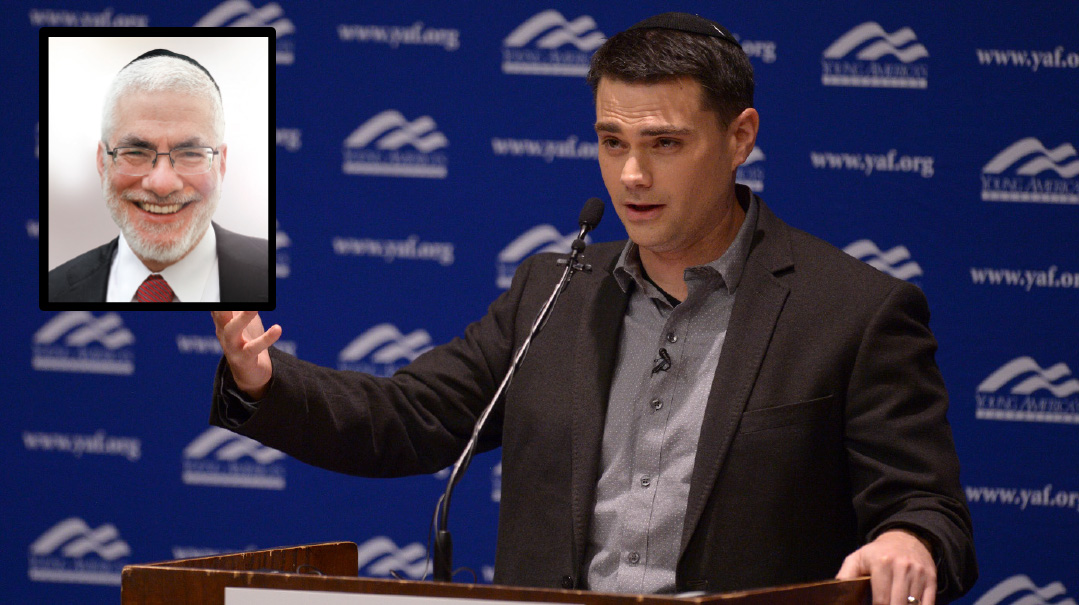From the Bitter Comes the Sweet

“Living well really is the best revenge”

T
he first question from the audience at the recent Ben Shapiro–Jordan Peterson event in Jerusalem was about the importance of gratitude — a question that had no obvious relationship to anything either man had said.
Both speakers confirmed the centrality of gratitude for them, but in far different ways. Shapiro emphasized the public aspect of gratitude — i.e., the gratitude we owe preceding generations for the accumulated wisdom of which we are the heirs. Quoting a parable of G.K. Chesterton, he described the difference between progressives and conservatives as primarily a function of their attitude toward the collective wisdom of mankind.
Two men are walking in a field when they come upon a fence. The progressive can see no obvious reason for the fence to be there, and immediately decides to rip it up. The conservative, by contrast, asks himself: Who built this fence? For what purpose? Is there still a similar need today?
Peterson, however, addressed the issue of gratitude from an entirely personal perspective. He related that his mother-in-law had recently passed away from a degenerative neurological disease, which he described as an ongoing process of losing pieces of herself little by little over 15 years.
Her decline and eventual death over a decade and a half had no doubt been a tragedy. But as he noted, it had not only been a tragedy. It had also been an occasion of celebration — not of her suffering, of course, but of her husband’s devotion and sacrifice for that entire period. Peterson described how his father-in-law — “the life of the party” in his small town in Western Canada — had basically remained at his wife’s side constantly for the entire period and tended to her by himself.
When the family gathered after her passing, every person realized that they had been witness to something quite extraordinary: selfless devotion to a beloved spouse over a prolonged period. And that example had changed all those who witnessed it. Certain tensions that had existed within the family and among siblings simply melted away in the face of the father’s example. All that had previously divided members of the family seemed so trivial when put beside the love that had given rise to so much self-sacrifice.
Peterson’s point was that the tragedy had also been a source of blessing, as it had brought forth from his father-in-law qualities that even he may not have known he possessed. The ability to discover the blessing in the midst of sadness and suffering, Peterson suggested, reflects a profound sense of gratitude.
Another who discovered many unimagined blessings amid a nightmarish experience is Joshua Katz, who was fired by Princeton University on May 23, 2022, after 25 years on the classics faculty and the receipt of numerous awards for excellence in teaching. In the autumn issue of Sapir, a publication of the Maimonides Fund, edited by Bret Stephens, Katz writes about all the good things that came out of the two-year ordeal leading up to his firing.
I have already written at length about how Princeton officialdom, including president Christopher Eisgruber, placed a target on Katz’s back by publicly labeling him a racist, using deliberately doctored quotations. (See “Struggle Sessions in the Ivy League,” Issue #912.)
In his Sapir piece, Katz does not make light of the suffering inflicted by his cancellation, including: “colleagues with whom I used to laugh every day no longer acknowledg[ing] my existence”; “students who had previously asked for my attention around the clock remov[ing] me from acknowledgments of their work”; calls upon scholars to no longer cite his publications, and for academic journals and presses to no longer publish anything he wrote.
But the blessings outweighed those costs. First and foremost was the discovery of who his real friends are. Though he had been proven wrong in his belief that he had lots of friends, Katz writes, “I have gained more friends than I lost — and they are real friends.” Those friends are no longer primarily academics, but also include school teachers, interior designers, priests, guitarists, and stay-at-home parents. He has been freed forever from the illusion that elite echelon of the academy is the pinnacle of culture.
He and his new friends can get together without fear that “our unscripted remarks are being recorded for use against us, without fear that we might be accused for no good reason of one or another -ism or -phobia...”
And by virtue of his cancellation, he has become part of a culture of care of people who do their best to look after one another. His list includes — in addition to his faculty colleague and advocate at Princeton, Robert George — liberal philosopher Peter Boghossian, former New York Times journalist Bari Weiss (whose Substack site, Common Sense, is a repository of just that), geophysicist Dorian Abbot, and libertarian legal scholar Ilya Shapiro.
There is something to be said for a second career, Katz acknowledges, outside the academic bubble in which he had spent nearly a quarter century. And all sorts of new opportunities have opened up for him by virtue of the notoriety his case received.
His acceptance of and subsequent delight in a fate he would not have chosen leads Katz to conclude that “living well really is the best revenge.”
Peterson and Katz provide good examples of the capacity to reframe negative experiences in ways to emphasize the positive. That is an ability that is for easier for those of us who believe in a beneficent Creator, Who guides our lives for our good. And one we cultivate to our great benefit.
New Publications
It is no secret to regular readers of this column that I am a huge fan of Rabbi Immanuel Bernstein’s work. I have written in the past about his works on teshuvah, Chumash, Pesach, Purim, and Chanukah.
Every week, I look forward to his “Dimensions in Chumash” article on the parshah. A collection of those articles on Bereishis and Shemos, entitled Dimensions in Chumash (Mosaica Press), has now appeared, with a second volume on the remaining books of Chumash set to go to the printers.
Let me just share one example of the riches to be found in Rabbi Bernstein’s presentations, that of Sarah’s laughter after overhearing Avraham’s guest telling him that next year, at the same time, Sarah would give birth to a son. At that point, Hashem asks Avraham why Sarah laughed. Did she not know that nothing was beyond Hashem’s powers? Sarah then denies that she laughed, out of fear. But that claim is rejected by Hashem.
The brief passage raises many questions. Even if Sarah initially thought that angel’s words to Avraham were only the type of brachah that a wayfarer might give to his host, once Hashem personally identified Himself as the source of the promise, how could Sarah, a prophetess in her own right, have denied that she laughed? And why did Hashem have to seemingly reprimand Sarah Himself? Why could the angel not have done so?
To answer the latter question, Rabbi Bernstein brings an apparent disagreement between Tosafos (Shabbos 12b), who maintains that angels know the thoughts of man, and the verse “Hashem knows the thoughts of man” (Tehillim 94:11), which implies that only Hashem knows man’s thoughts.
Rav Moshe Hagiz resolves the difficulty by identifying two stages in a person’s thought processes: first, an initial inchoate thought, and only subsequently a concrete thought. Angels can know the latter, but only Hashem knows a person’s thoughts in the inchoate stage.
Sarah Imeinu’s laughter at hearing that she would give birth was at the inchoate stage. Thus it was not expressed externally; she only laughed internally — “b’kirbah.” And in her fear, after having been accused of skepticism, she could not even identify that inchoate feeling within her.
Nevertheless, it was crucial for Hashem to point out to Sarah the element of doubt she had expressed. In order for Avraham and Sarah to be worthy of producing a child, despite their advanced years, they had to be of a perfect faith of Hashem’s ability to do such a miracle on their behalf, and that was the point of Hashem’s calling attention to the existence of some element of doubt on Sarah’s part.
Such treasures are to be found in every chapter of Rabbi Bernstein’s new work.
(Originally featured in Mishpacha, Issue 937. Yonoson Rosenblum may be contacted directly at rosenblum@mishpacha.com)
Oops! We could not locate your form.







